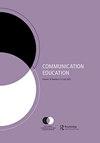Against the grain
IF 0.8
Q3 COMMUNICATION
引用次数: 398
Abstract
ABSTRACT This agenda-setting theory essay offers a collaborative response to Sprague, J. (1992). Expanding the research agenda for instructional communication: Raising some unasked questions. Communication Education, 41(1), 1–25. https://doi.org/10.1080/03634529209378867 early theorizing on critical approaches to communication pedagogy, developing it to account not only for critical developments since but also to the political precarity increasingly organizing everyday life, especially of the dispossessed and particularly of the Global South (Shome, 2020). Indeed, we argue that the only viable pedagogical route that responds to the precariousness of life in the twenty-first century must be emancipatory rather than reformist. To make our point, we offer a metareview of over a century of literature published in the Quarterly Journal of Speech (1915–1952) and Communication Education (formerly The Speech Teacher; 1952–2021) to reveal the same Western liberal philosophies of education undergirding communication pedagogies generally. In this regard, our agenda-setting essay calls for a paradigmatic shift against the grain and toward emancipatory futurities. Content warning: This essay cites anti-Indigenous, anti-Black, and xenophobic discourse; take good care of yourself as you move through these pages interrogating our disciplinary complicities.不合常理的
摘要:这篇议程设置理论文章是对Sprague,J.(1992)的合作回应。扩大教学交流的研究议程:提出一些未经询问的问题。传播教育,41(1),1-25。https://doi.org/10.1080/03634529209378867传播教育学批判方法的早期理论化,发展它不仅要考虑到自那以来的批判发展,还要考虑到日益组织日常生活的政治不稳定,尤其是被剥夺者的日常生活,尤其是全球南方的日常生活(Shome,2020)。事实上,我们认为,应对21世纪生活不稳定的唯一可行的教学途径必须是解放,而不是改革。为了表明我们的观点,我们对发表在《演讲季刊》(1915-1952)和《沟通教育》(前身为《演讲老师》;1952–2021)上的一个多世纪的文献进行了元回顾,以揭示支撑沟通教育学的西方自由主义教育哲学。在这方面,我们的议程设定文章呼吁对粮食和解放未来进行典型的转变。内容警告:本文引用了反土著、反黑人和仇外言论;当你浏览这些询问我们的违纪行为的页面时,要照顾好自己。
本文章由计算机程序翻译,如有差异,请以英文原文为准。
求助全文
约1分钟内获得全文
求助全文
来源期刊

COMMUNICATION EDUCATION
EDUCATION & EDUCATIONAL RESEARCH-
CiteScore
3.10
自引率
34.80%
发文量
47
期刊介绍:
Communication Education is a peer-reviewed publication of the National Communication Association. Communication Education publishes original scholarship that advances understanding of the role of communication in the teaching and learning process in diverse spaces, structures, and interactions, within and outside of academia. Communication Education welcomes scholarship from diverse perspectives and methodologies, including quantitative, qualitative, and critical/textual approaches. All submissions must be methodologically rigorous and theoretically grounded and geared toward advancing knowledge production in communication, teaching, and learning. Scholarship in Communication Education addresses the intersections of communication, teaching, and learning related to topics and contexts that include but are not limited to: • student/teacher relationships • student/teacher characteristics • student/teacher identity construction • student learning outcomes • student engagement • diversity, inclusion, and difference • social justice • instructional technology/social media • the basic communication course • service learning • communication across the curriculum • communication instruction in business and the professions • communication instruction in civic arenas In addition to articles, the journal will publish occasional scholarly exchanges on topics related to communication, teaching, and learning, such as: • Analytic review articles: agenda-setting pieces including examinations of key questions about the field • Forum essays: themed pieces for dialogue or debate on current communication, teaching, and learning issues
 求助内容:
求助内容: 应助结果提醒方式:
应助结果提醒方式:


